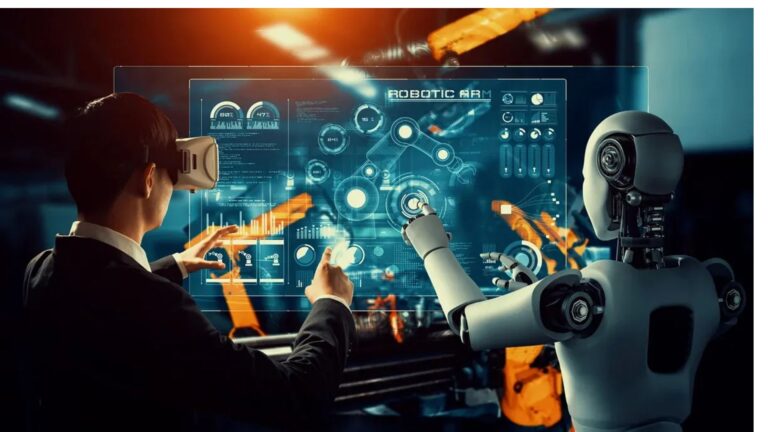Will robots be our helpful assistants or eventually outsmart us? As AI-powered robots advance, they are transforming industries, automating tasks, and reshaping daily life.
From self-driving cars to robotic surgeons, the future of robotics is here. But will robots replace human jobs or create new opportunities? Let’s explore how robotics and AI are shaping our world.
What is Robotics?
Robotics is the field of engineering and technology focused on designing, building, and operating robots. A robot is an autonomous or semi-autonomous machine capable of performing tasks with minimal human intervention. Robotics combines mechanical engineering, electrical engineering, and computer science to develop intelligent systems.
Types of Robots
1. Industrial Robots
- Used in manufacturing, assembly lines, and logistics.
2. Autonomous Robots
- Function without human intervention, such as self-driving cars.
3. Humanoid Robots
- Designed to mimic human appearance and behavior.
4. Medical Robots
- Assist in surgeries, diagnostics, and patient care.
5. Service Robots
- Perform household tasks, customer service, or personal assistance.
6. Military & Space Robots
- Used for defense, reconnaissance,and space exploration.
Advantages and Disadvantages of Robots
| Advantages | Disadvantages |
|---|---|
|
Struggles with unstructured tasks.
|
The Future of Robotics: How Will Robots Change the World?
The Future of Robotics is revolutionizing industries with AI and automation, enhancing efficiency, precision, and safety. From healthcare and manufacturing to space exploration, robots are improving productivity, reducing labor costs, and handling hazardous tasks. While they bring benefits, concerns like job displacement and security risks remain. The Future of Robotics lies in human-AI collaboration, shaping a smarter, automated world.
How Robotics is Transforming Daily Life?
Robots are enhancing home automation, healthcare, transportation, and retail with AI and automation. Smart assistants, robotic vacuums, AI healthcare, autonomous vehicles, and AI chatbots are making daily tasks more efficient. Robotics is seamlessly integrating into life, creating a smarter, automated world.
Robotics in Different Industries: A Glimpse into the Future
Robotics is revolutionizing industries with AI and automation, boosting efficiency, precision, and productivity.
1. Healthcare
Robotic surgeries, AI diagnostics, and patient care automation.
2. Manufacturing
Automated assembly lines and robotic quality control.
3. Agriculture
AI-driven drones and robotic harvesting systems.
4. Transportation
Self-driving cars, delivery robots, and smart logistics.
Will Robots Replace Human Jobs? The Impact on Employment
Robots are reshaping the job market by automating repetitive and hazardous tasks. While robots enhance efficiency and productivity, they also lead to job displacement in industries like manufacturing, retail, and customer service.
However, robotics also creates new opportunities in AI development, robot maintenance, and automation management. Instead of full replacement, the workforce is shifting toward human-AI collaboration, where robots handle repetitive tasks, and humans focus on creativity, problem-solving, and supervision.
Ethical Challenges and Risks in AI-Driven Robotics
Robotics brings incredible advancements but also raises ethical concerns. As AI-driven robots become more autonomous, questions about privacy, security, and decision-making arise.
1. Job Displacement
Automation replaces tasks, impacting employment.
2. Data Privacy
AI collects and processes vast amounts of personal data.
3. Bias in AI
Algorithms may reinforce societal biases, affecting fairness.
4. Security Risks
Hacking and misuse of robotic systems pose threats.
The Future of Robotics should prioritize human values, transparency, and responsible AI to create a future where technology benefits everyone.
What’s Next?
The Future of Robotics is evolving rapidly, bringing groundbreaking advancements:
1. Rise of Humanoid Robots
AI-powered robots are enhancing workplaces and daily life.
2. AI Assistants
Smarter, more intuitive virtual assistants improve automation.
3. Societal Impact
Robotics will reshape industries, jobs, and human interactions.
The Future of Robots lies in human-AI collaboration, ensuring a balance between innovation and ethical responsibility.
Conclusion: Embracing the Robotic Revolution
Robots are transforming industries, daily life, and the job market. AI-driven automation, humanoid robots, and smart assistants are revolutionizing efficiency and productivity.
While robots take over repetitive tasks, human creativity, problem-solving, and ethical oversight remain irreplaceable. The key to progress lies in human-AI collaboration, ensuring technology enhances lives while maintaining ethical responsibility.
By embracing the robotic revolution, we can create a future where humans and robots coexist, driving innovation and efficiency together.

